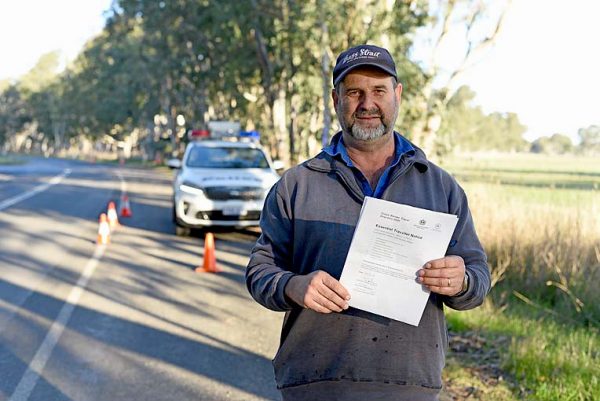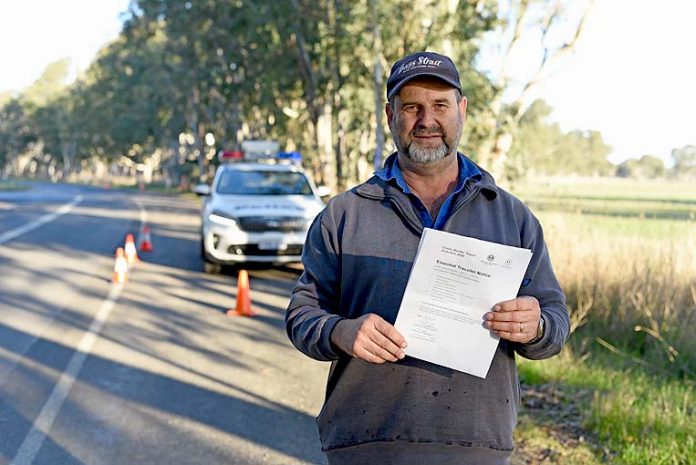
A WARRAWINDI farmer continues to navigate changing cross-border compliance measures that impact his interstate agricultural enterprise.
Last week’s introduction of tightened restrictions along the South Australian-Victoria border created a mountain of paperwork for David Galpin, who had to submit 16 new applications for his family and staff to cross the border on Casterton Road.
Mr Galpin’s business previously had exemptions granted by the State Government under prior essential traveller status, however last week’s changes meant he had to reapply for 16 people – including his one-year-old grandson – to meet current requirements.
The strong stance on border control, which only allows essential Victorian travellers to travel 50km into South Australia from the border, was implemented as Victoria continues to register hundreds of new COVID-19 cases daily, the majority in Melbourne and surrounding districts.
Travelling between the two states daily to attend to his properties, Mr Galpin said while the initial change was difficult to manage, he was happy to comply with the new requirements.
“I found out about my previous paperwork as I was coming back into South Australia from visiting my property in Victoria,” Mr Galpin said.
“It was a bit daunting knowing they may or may not let you across and it is a little frustrating because we have not been told about the changes previously.
“I do not think the South Australian Government realised how many people cross the border regularly.”
Mr Galpin completed the large number of applications the night before his next scheduled visit to his Victorian properties, where he was in the process of building fences and sheep sheds.
“We would then receive an application number that we provide to the police manning the border and they would work it out from there even if the application had not been processed yet,” he said.
“That is what they were told to do and so that is what they have done, which is fine by us.”
Mr Galpin said he found the online application process slightly confusing, with some questions not relating to the projects he and his staff were scheduled to do over the border.
“We had to give evidence of why we needed to cross the border so we put in our driver’s licence and rates notices for the properties in Victoria, but with the kids we had to try and figure out what they could put in,” he said.
“We also have children over in Victoria who live on our property so it does not accommodate all circumstances.”
Alongside the cross-border confusion, Mr Galpin said the border closures also prevented a Victorian agronomist from attending his South Australian property to complete tissue tests and energy levels in his pasture.
“We have since had to correspond via email and we will have to wait until he can get across which may set us back a month or two on what we can do with fertiliser and pasture management,” he said.
Despite the set backs, Mr Galpin said the border restrictions had not impacted his day-to-day activities and congratulated the State Government on its immediate response to the COVID-19 cases occurring over in Victoria.
“We may need to plan things a little differently and plan when we cross the border but we would like to finish off the work in our Victorian paddocks sooner rather than later which may mean we need to do more trips over the border,” he said.
Since the border restrictions had been enforced Mr Galpin said he had noticed many vehicles travelling Casterton Road who were likely to be essential travelers.
“You get to notice who is and who is not essential travellers and most of what we have been seeing is people abiding by the rules,” he said.
“It is pleasing to know that people are listening and doing what they are supposed to be doing but there will always be that 1pc who do not.”








